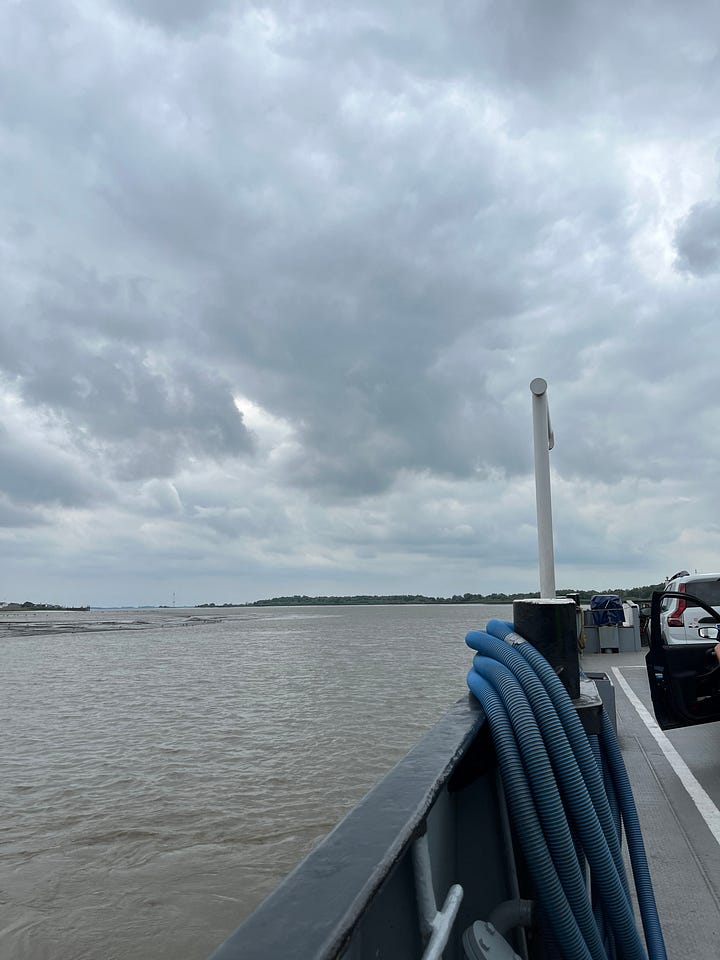In 9 AD three Roman legions were busy extending the tax base of the Roman empire in Germany, in the usual brutal fashion, when they were famously thrashed at the battle of Teutoberg Forest. (Kalkreise, to be precise.) Their commander, Publius Quinctilius Varus, perhaps guessing he would not be flavour of the month once the news reached Rome, fell on his sword. The story goes that the aging Emperor Augustus was so upset he wandered the imperial palace banging the imperial head against the highly-decorated walls, and wailing, ‘Quinctilius Varus, give me back my legions!’
He never got the legions back, nor the short-lived Roman province of Germania Magna (between the Rhine, the Danube and the Elbe). By and large, that was the end of Rome’s ambitions north-east of the Rhine.


If you’ve been following my travel blog you’ll know we’ve just come back from several weeks’ travelling on our wonderful Triumph Tiger, beyond the bounds of the Roman empire: across to the Netherlands, north to the German coast, on into the three Baltic states, and then home via Scandinavia. (The featured top image is Groningen in the Netherlands).
It was interesting for us to venture to places the Romans never came, encountering languages (Baltic, Finno-Ugric and Germanic) little influenced by Latin, and staying in towns and cities with no buried forum, fort or villa. Saved a lot of time crawling round Roman ruins, too.
I have an authorial interest in places free from Roman colonisation, as you’ll know if you’re read my third novel, The Loyal Centurion. My forthcoming Quintus Valerius mystery — publication date tba — is set in Bath, in the heart of Roman Britannia. But it won’t be a spoiler to tell you now that the next (fifth) book will take us to Hibernia (Ireland). Why? Because, just like Caledonia in The Loyal Centurion, lack of colonial status turns out not to equate with lack of Roman influence.
My upcoming research trip to Ireland will include Drumanagh, an exciting promontory site north of Dublin. Digs in Drumanagh show increasing evidence of not just trade between the ancient Irish and Romano-Britons, but tantalising hints of Romanised Britons living and working there for sustained periods. All this has been greeted with what could be called hysteria in some excited Irish circles. I prefer to rely on more authoritative sources. So it’s a mixed picture, but there’s enough so far from archaeology to show that places like Iron Age Ireland were not hermetically sealed from Roman influence.
[Image credit: fingal.ie]
And then there’s Poland. Surely not, I hear you say. Surely the Romans never went to Poland? Maybe not in person, but some of their stuff certainly made it there: among other evidence, four Roman brooches, a ring, and decorative fragments were found only this year in a forested area of northern Poland. Suggestive at least of trading contacts between late 2nd/early 3rd century Rome, and the ancient Poles of the Bogaczewo or Sudovian cultures. And no, before you ask, I have no plans to send Quintus and Tiro to Poland. Not yet, anyway.
So, no trip is ever wasted on a Roman novelist. Do check out our motorbike adventures blog, if you’d like to follow our trail around the Baltic this summer. Plus there is plenty of Roman interest to be found in our 2022 trip to Spain and Portugal, Tigger Goes to Iberia.
Enough of my holiday snaps, except to wish you a blissful remaining summer, and happy landings if you’re about to head away yourself.



My News
Colwall Art and Craft Festival
I’ll be here with my trusty marquee at St James the Great, Mill Lane, Colwall, come hail, come storms, on Saturday 16th August. As well as chatting to readers, signing and selling books. I’ll be reading from The Loyal Centurion, and letting you have a sneaky preview of my brand-new fourth book, The Bath Curse. Come along to the tea room in the Ale House for my readings, along with scrumptious cakes and tea.
An upcoming date with the lovely Coffee and Crime bunch at Malvern library. I’ll be there on Friday 6 September, 11.00 am, when we’ll discuss all things deadly and criminal in Roman Britain, in gruesome detail. No spoilers, of course.
Later on…
Fingers crossed that the much-mooted Leicester Roman festival takes place this autumn. It’s all about celebrating the re-opening of the Jewry Wall museum, Leicester of course being the prominent Roman city, Ratae. My place on the Roman author panel is booked, my costume dusted down and ready. Watch this newsletter for updates.
I’m booked to talk to the Evesham U3A on Wednesday 2nd April, 2025. I’m looking forward to my return trip to Evesham, and to meeting new lively-minded readers.
My summer reading
While my editor and beta readers have been giving the draft of The Bath Curse a scrutiny — and in between ferries and long motorbike rides across northern Europe — I’ve been catching up on my own reading. Here are some books I’ve enjoyed, in no particular order:
Of course I loved this, being a raging King fan. This one is Jack the Giantkiller meets To Kill a Mockingbird. Let King’s amazing world-building just take you away.
The Ministry of Time by Kaliane Bradley
This debut novel by British-Cambodian Bradley is right up my street: a sci-fi novel with historical elements, and a mystery to boot. And there’s romance, too! What’s not to like?
A Talent for Murder by Peter Swanson
I know, I know, I’m really late to this party. But for anyone else who doesn’t yet know Swanson’s books, this is the third of his pacy, twisty Henry Kimball thrillers. I gobbled it down, and immediately downloaded the preceding two in the series. Best part? The lovable and yet horrific Lily Kintner, the deadliest and most alluring amoral detective going.
You Are Here by David Nicholls
Deservedly a best-seller. Touching and atmospheric, with the added bonus for those who love long-distance walks of being familiar territory.
[Jacquie’s latest Roman mystery, The Loyal Centurion, is out in ebook and paperback now. You can follow Jacquie on social media, watch her research videos, and read her non-fiction articles at Linktree.]





